Finalists
Fuse is delighted to announce the finalists for the 2025 Fuse Awards, celebrating outstanding contributions to public health research, policy and practice across the North East and North Cumbria.
Excellence in Public Involvement and Engagement
Felicity Shenton - Public Involvement and Community Engagement Manager, NIHR Applied Research Collaboration (ARC) North East and North Cumbria (NENC)-320x320.jpg)
Felicity is a champion of public involvement, creating inclusive opportunities for people and communities to meaningfully shape health and care research. She co-developed the NENC Peer Research Community of Practice, jointly hosted by Fuse and ARC NENC, engaging over 200 participants across seven meetings. This led to new collaborations, a training course, and creative Public Involvement and Engagement methods using Lego, drawing and Fuse blogs and research briefs. Fizz has also established a Public Advisory Network and a Young Public Advisory Network, while piloting innovative impact evaluation methods. Her work has improved research quality and exemplifies best practice in public involvement across the region.
On finding out about being nominated, Fizz said:
“The ARC NENC is committed to ensuring that there is meaningful and transformational public involvement and community engagement across all aspects of the health and care research that it has been supporting since 2019.
“My role has been to create reciprocal and sustainable partnerships to support genuine co-production with people and communities. This doesn’t happen in isolation, and I have worked with many fantastic people and organisations.
“True public involvement and community engagement is a social justice issue and we must ensure that the people most affected by structural inequalities are involved in all aspects of the research that aims to address the issues.”
Joyful and Safe Physical Activity (JASPA) project team
Caroline Dodd-Reynolds, Scarlet Hall (Durham University); Mary Crowder (University of Sheffield); Hart Gables Youth Group; and Chilypep (Children and Young People’s Empowerment Project)
During the JASPA project, researchers co-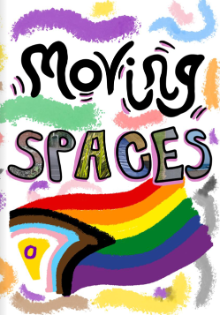 produced a zine with LGBTQIA+ youth groups to meaningfully embed lived experience into public health research. Through creative workshops using mapping and collaging, young people shared their hopes, worries, and ideas for making physical activity feel safer and more inclusive. The resulting zine features their drawings, poems and reflections, communicating these insights to academics, practitioners and policy-makers. Since its launch in early 2025, over 150 hard copies have been distributed and findings shared at regional and national events. The team is now working with partners to translate the zine into training for influential adults, demonstrating innovative, creative, and impactful engagement. The project is funded by the NIHR School for Public Health Research (SPHR).
produced a zine with LGBTQIA+ youth groups to meaningfully embed lived experience into public health research. Through creative workshops using mapping and collaging, young people shared their hopes, worries, and ideas for making physical activity feel safer and more inclusive. The resulting zine features their drawings, poems and reflections, communicating these insights to academics, practitioners and policy-makers. Since its launch in early 2025, over 150 hard copies have been distributed and findings shared at regional and national events. The team is now working with partners to translate the zine into training for influential adults, demonstrating innovative, creative, and impactful engagement. The project is funded by the NIHR School for Public Health Research (SPHR).
"The project helped to reframe the idea of what physical activity spaces could look like. If people listened more to young people and allowed themselves to be educated by our lived experiences, it would have a huge impact on how we can design and use physical activity spaces."
Ruby Chandler Youth Worker, co-researcher and young person - Children and Young People’s Empowerment Project
WHOLE-SMI Community Advisory Group
The WHOLE-SMI Community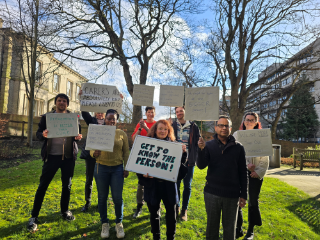 Advisory Group (CAG), made up of people with lived experience of severe mental ill-health (SMIH), their carers and/or family member to offer insights into physical and mental health support for people living with SMIH in the North East and North Cumbria. We can often become disenfranchised when experiencing long-standing barriers and frustrations at missed opportunities to enhance our health services and support, but the CAG remained engaged and enthusiastic throughout the WHOLE-SMI project and determined to contribute and collaborate with us to promote the much-needed change in service provision. Their insights prompted inclusive eligibility criteria for those without formal diagnoses, shaped non-stigmatising language, and guided the interpretation of findings. Collaboratively, they co-wrote a Fuse published open letter to the Prime Minister, authored the headlines of the research, and developed blogs and vlogs, ensuring public dissemination reflected their priorities. Collectively, the CAG developed into its own advocacy group and safe space for members. The CAG’s ongoing involvement in follow-on work embeds best practice for public involvement, creating a sustainable space for advocacy, peer support, and meaningful co-production in mental health research.
Advisory Group (CAG), made up of people with lived experience of severe mental ill-health (SMIH), their carers and/or family member to offer insights into physical and mental health support for people living with SMIH in the North East and North Cumbria. We can often become disenfranchised when experiencing long-standing barriers and frustrations at missed opportunities to enhance our health services and support, but the CAG remained engaged and enthusiastic throughout the WHOLE-SMI project and determined to contribute and collaborate with us to promote the much-needed change in service provision. Their insights prompted inclusive eligibility criteria for those without formal diagnoses, shaped non-stigmatising language, and guided the interpretation of findings. Collaboratively, they co-wrote a Fuse published open letter to the Prime Minister, authored the headlines of the research, and developed blogs and vlogs, ensuring public dissemination reflected their priorities. Collectively, the CAG developed into its own advocacy group and safe space for members. The CAG’s ongoing involvement in follow-on work embeds best practice for public involvement, creating a sustainable space for advocacy, peer support, and meaningful co-production in mental health research.
“It means a lot to me to see our Community Advisory Group receive the recognition they deserve by being shortlisted. Their enthusiasm and engagement throughout the WHOLE-SMI project has been wonderful to witness, and it has been an absolute joy collaborating with them and amplifying the voices of people living with severe mental ill-health”
Dan Steward, Research Assistant, Newcastle University
Innovative and Creative Communications
Divided Households: Supporting children and young people with a family member in prison
Naomi Griffin, Research Associate, Newcastle University
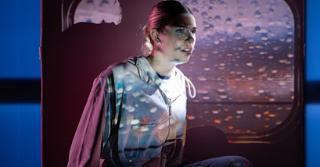 Led by early career researcher Naomi Griffin, this project exemplified creative and collaborative communication of research. Working closely with children and young people who have experienced visiting a parent in prison, the team co-produced a range of accessible, engaging outputs that respectfully reflected their lived experiences. These included illustrated comic strips, a powerful short film ‘Better for Everyone’, and a theatre performance ‘8 Hours There and Back’ (pictured) staged at Newcastle’s Northern Stage. These innovative formats effectively reached public, practitioner, and policy audiences, ensuring wide impact and engagement on a sensitive topic.
Led by early career researcher Naomi Griffin, this project exemplified creative and collaborative communication of research. Working closely with children and young people who have experienced visiting a parent in prison, the team co-produced a range of accessible, engaging outputs that respectfully reflected their lived experiences. These included illustrated comic strips, a powerful short film ‘Better for Everyone’, and a theatre performance ‘8 Hours There and Back’ (pictured) staged at Newcastle’s Northern Stage. These innovative formats effectively reached public, practitioner, and policy audiences, ensuring wide impact and engagement on a sensitive topic.
Project 2,999: Increasing the visibility of exclusion from school
Sarah Martin-Denham (University of Sunderland), Hayley Hudson, Paul Longstaff, Karen Longstaff, Mags Farquhar (parents and public partners)
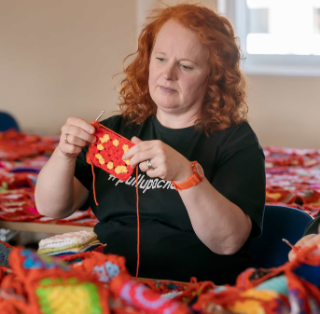 The Project 2,999 team used an innovative and powerful visual medium - a nine metre crocheted blanket of 2,999 squares - to creatively communicate the impact of school exclusions in England. Co-produced with parents of excluded children, the blanket serves as both a symbol of the scale of the issue and to stimulate conversation. Touring the blanket nationally, the team engaged with 24 organisations - including the Children’s Commissioner Office and multiple councils - using lived experience to drive dialogue and challenge perceptions. Events included conferences, exhibitions and roundtables, gaining national attention through BBC News and an impactful film. This creative, arts-based dissemination method has been widely shared and supported by multi-sector partners, demonstrating collaboration, scope, and strong public engagement to amplify marginalised voices.
The Project 2,999 team used an innovative and powerful visual medium - a nine metre crocheted blanket of 2,999 squares - to creatively communicate the impact of school exclusions in England. Co-produced with parents of excluded children, the blanket serves as both a symbol of the scale of the issue and to stimulate conversation. Touring the blanket nationally, the team engaged with 24 organisations - including the Children’s Commissioner Office and multiple councils - using lived experience to drive dialogue and challenge perceptions. Events included conferences, exhibitions and roundtables, gaining national attention through BBC News and an impactful film. This creative, arts-based dissemination method has been widely shared and supported by multi-sector partners, demonstrating collaboration, scope, and strong public engagement to amplify marginalised voices.
Twinkle Twinkle Arti Team
Cassey Muir, Ruth McGovern, Debbie Smart (Newcastle University); Josie Brookes (Illustrator); Danielle Slade (author); and public contributors.
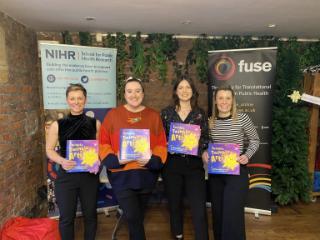 The Twinkle, Twinkle Arti team has transformed Cassey Muir’s PhD research and the SafeSpace project, with Fuse and the NIHR School for Public Health Research (SPHR), into a creative public health resource for children affected by parental substance use. Co-produced with a children’s author, illustrator, educators and families, the storybook blends narrative, illustration and lived experience to support emotional wellbeing. Distributed as 650 printed copies and over 5,000 free digital downloads, and accompanied by an original read-aloud video (23,600+ views), library readings, podcasts and blog posts, it exemplifies inventive dissemination. Partnerships with local, national, and international organisations such as Alcohol Action Ireland have broadened its reach, while plans for a Welsh-language version with audio recording and a puppet show demonstrate its collaborative nature and expanding impact.
The Twinkle, Twinkle Arti team has transformed Cassey Muir’s PhD research and the SafeSpace project, with Fuse and the NIHR School for Public Health Research (SPHR), into a creative public health resource for children affected by parental substance use. Co-produced with a children’s author, illustrator, educators and families, the storybook blends narrative, illustration and lived experience to support emotional wellbeing. Distributed as 650 printed copies and over 5,000 free digital downloads, and accompanied by an original read-aloud video (23,600+ views), library readings, podcasts and blog posts, it exemplifies inventive dissemination. Partnerships with local, national, and international organisations such as Alcohol Action Ireland have broadened its reach, while plans for a Welsh-language version with audio recording and a puppet show demonstrate its collaborative nature and expanding impact.
"We’re thrilled to see Twinkle, Twinkle Arti shortlisted! With out of this world storytelling and vibrant illustrations, the storybook shines a light on difficult family situations, empowering children to talk about and understand their feelings."
Cassey Muir, Research Associate, Newcastle University
Outstanding Translational Research Initiative
Eyes on the Baby Team
Helen Ball, Professor of Anthropology and Director of the Durham Infancy & Sleep Centre (Durham University), and Partners.
 Eyes on the Baby is an exemplary translational research initiative tackling Sudden Unexpected Infant Death (SUDI) inequalities in the North East. Co-designed by researchers and strategic managers across County Durham and Northumberland, this multi-agency workforce programme trains staff - housing officers, librarians, domestic violence teams, Family Hub workers, mental health teams, police, and ambulance staff - to deliver targeted SUDI-prevention support to priority families facing poverty, mental health, domestic abuse, substance use, and housing insecurity. Since 2022, over 2,600 staff have been engaged. Backed by Public Health Children & Young People leads and the North-East Office for Health Improvement & Disparities (OHID), the programme is now being scaled region-wide, building a sustainable community of practice to reduce SUDI disparities. It has been funded by NIHR Applied Research Collaboration (ARC) North East and North Cumbria (NENC).
Eyes on the Baby is an exemplary translational research initiative tackling Sudden Unexpected Infant Death (SUDI) inequalities in the North East. Co-designed by researchers and strategic managers across County Durham and Northumberland, this multi-agency workforce programme trains staff - housing officers, librarians, domestic violence teams, Family Hub workers, mental health teams, police, and ambulance staff - to deliver targeted SUDI-prevention support to priority families facing poverty, mental health, domestic abuse, substance use, and housing insecurity. Since 2022, over 2,600 staff have been engaged. Backed by Public Health Children & Young People leads and the North-East Office for Health Improvement & Disparities (OHID), the programme is now being scaled region-wide, building a sustainable community of practice to reduce SUDI disparities. It has been funded by NIHR Applied Research Collaboration (ARC) North East and North Cumbria (NENC).
Increasing Access to Healthy Affordable Food Team
Jo Smith, Ashley Blacklock, Prof Amelia Lake, Prof Emma Giles, Prof Matthew Cotton, Dr Jibin He and Dr Helen Moore, Lisa Harris, Joe Dunne, Karen Jardine, Les and Kim, Joe Millar, Claire Atkins, Sally Smith, Dr Emma Tuschick and Dr Cara Jordan.
 This team of Fuse members from across research, healthcare and community, has demonstrated outstanding translational research through their feasibility study addressing food insecurity among people with severe mental illness (SMI) in Middlesbrough. Uniting the efforts of the Tees, Esk and Wear Valleys NHS Foundation Trust, Teesside University, and Middlesbrough Environment City, they co-designed a sustainable intervention that repurposes surplus food into healthy ready meal, 'Jenny's pasta' (pictured). These meals are now distributed via social supermarkets, improving diet quality while reducing food waste. Grounded in lived experience and Patient and Public Involvement and Engagement (PPIE), the project has led to real-world impact, with plans to scale up and extend screening for food insecurity in mental health settings.
This team of Fuse members from across research, healthcare and community, has demonstrated outstanding translational research through their feasibility study addressing food insecurity among people with severe mental illness (SMI) in Middlesbrough. Uniting the efforts of the Tees, Esk and Wear Valleys NHS Foundation Trust, Teesside University, and Middlesbrough Environment City, they co-designed a sustainable intervention that repurposes surplus food into healthy ready meal, 'Jenny's pasta' (pictured). These meals are now distributed via social supermarkets, improving diet quality while reducing food waste. Grounded in lived experience and Patient and Public Involvement and Engagement (PPIE), the project has led to real-world impact, with plans to scale up and extend screening for food insecurity in mental health settings.
Sunderland Plus Project Evaluation
Kat Jackson, Emma-Joy Holland, Liz Titchener (Newcastle University); and Sarah Schonewald (Recovery Connections)
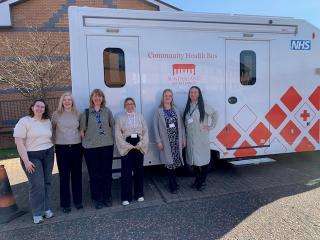
The Sunderland Plus Project Evaluation was shaped by the needs of underserved communities and aligned to local policy priorities. The team worked in close partnership with local government, third-sector organisations, the study public involvement and community engagement group, primary care and academia to launch a mobile health bus (offering primary care, preventative interventions and relational support) that improves access to healthcare for people facing substance use, mental ill-health, and homelessness. A Community Advisory Board was established to embed collaboration across sectors. Additional funding enabled the paid involvement of a lived experience researcher, whose insights shaped both the research and service design, ensuring relational and clinical support meet community needs. The project is funded by Sunderland City Council and the NIHR Applied Research Collaboration (ARC) North East and North Cumbria (NENC).
"The success of this project has been led by the community and underpinned by the enthusiasm of all the partners, who have a shared goal to use this opportunity to work together to help to reduce the significant health inequalities experienced by people who use substances in our region."
Dr Kat Jackson, Senior Research Associate, Population Health Sciences Institute, Newcastle University
Rising Star
Cassey Muir - Research Associate, Newcastle University
Cassey is an exceptional early career researcher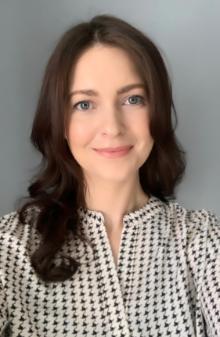 leading innovative public health work. Her PhD research, with Fuse and the NIHR School for Public Health Research, inspired Twinkle, Twinkle Arti, a storybook co-produced with families and professionals to support children affected by parental substance use. The book has reached thousands through print, downloads, and a video viewed over 21,800 times. Cassey’s leadership secured further NIHR funding to pilot the resource in primary schools. Her collaborative, creative approach engages those most in need and aims to reduce stigma. Cassey is making a meaningful impact and demonstrates clear potential as a future leader in public health research and communication.
leading innovative public health work. Her PhD research, with Fuse and the NIHR School for Public Health Research, inspired Twinkle, Twinkle Arti, a storybook co-produced with families and professionals to support children affected by parental substance use. The book has reached thousands through print, downloads, and a video viewed over 21,800 times. Cassey’s leadership secured further NIHR funding to pilot the resource in primary schools. Her collaborative, creative approach engages those most in need and aims to reduce stigma. Cassey is making a meaningful impact and demonstrates clear potential as a future leader in public health research and communication.
On being shortlisted, Cassey said:
"It’s a real honour to be shortlisted for the Rising Star Award. This recognition means so much and reflects the incredible support and collaboration I’ve experienced along the way."
Matt Cooper - Research Associate, NIHR Newcastle Patient Safety Research Collaboration
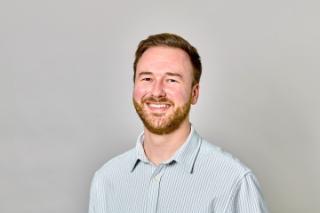 Matt is an early career researcher whose leadership and collaborative work across public health and longevity research exemplify a rising star. In just two years since joining the Patient Safety Research Collaboration (PSRC), he has led and co-authored multiple publications, secured internal and external funding as Principal Investigator, and delivered impactful projects with local authorities and health organisations. His supervision of funded internships and public involvement work has been nationally recognised by NIHR. A generous and strategic contributor, Matt supports Equality, Diversity and Inclusion (EDI), Engagement and Place initiatives and mentors colleagues. His dynamic contributions and influence across research and policy make him a clear emerging leader in public health.
Matt is an early career researcher whose leadership and collaborative work across public health and longevity research exemplify a rising star. In just two years since joining the Patient Safety Research Collaboration (PSRC), he has led and co-authored multiple publications, secured internal and external funding as Principal Investigator, and delivered impactful projects with local authorities and health organisations. His supervision of funded internships and public involvement work has been nationally recognised by NIHR. A generous and strategic contributor, Matt supports Equality, Diversity and Inclusion (EDI), Engagement and Place initiatives and mentors colleagues. His dynamic contributions and influence across research and policy make him a clear emerging leader in public health.
On being shortlisted, Matt said:
"I am honoured to be shortlisted for this Fuse Award. Having been part of Fuse since being a postgrad and seeing the great work people are doing, its amazing to be considered for the award."
Neha Jain - NIHR School for Public Health Research (SPHR) Pre-doctoral Fellow
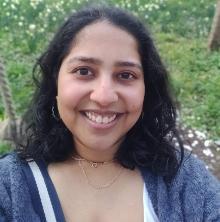
Neha is an outstanding early career public health researcher with a background in dentistry. Her work focuses on upstream policy actions to improve public and oral health and reduce inequalities. She has collaborated with global and national policymakers and recently led policy briefs on tobacco and alcohol. In the North East, she is co-developing oral health solutions for children with learning disabilities and exploring access to healthcare for marginalised groups. With funding from NIHR SPHR and others, Neha has demonstrated strong leadership potential and a clear trajectory as a future leader in public health research and policy.
Director's Award
This will be awarded at the event by Fuse Director Professor Sheena Ramsay.






